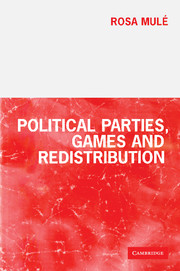Book contents
- Frontmatter
- Contents
- List of figures
- List of tables
- Acknowledgments
- Introduction
- 1 Political parties, games and income redistribution
- 2 Opposition effects, blackmail and u-turns under Pierre Elliot Trudeau
- 3 The arithmetics of politics under Margaret Thatcher
- 4 Right-wing ascendency, pivotal players and asymmetric power under Bob Hawke
- 5 The demise of the federal social safety net under Clinton
- 6 Conclusions
- Technical addendum
- Bibliography
- Index
1 - Political parties, games and income redistribution
Published online by Cambridge University Press: 22 September 2009
- Frontmatter
- Contents
- List of figures
- List of tables
- Acknowledgments
- Introduction
- 1 Political parties, games and income redistribution
- 2 Opposition effects, blackmail and u-turns under Pierre Elliot Trudeau
- 3 The arithmetics of politics under Margaret Thatcher
- 4 Right-wing ascendency, pivotal players and asymmetric power under Bob Hawke
- 5 The demise of the federal social safety net under Clinton
- 6 Conclusions
- Technical addendum
- Bibliography
- Index
Summary
The essence of politics is redistribution, and political conflicts centre on matters of distribution.
Karl BrunnerWhat are the incentives for income redistribution in democratic systems? At two opposite ends of the spectrum stand interpretations based on rational choice theory and political sociology. For the former, ruling parties redistribute income tomaximise votes, for the latter, parties have contrasting distributive goals that are consistent with the interests of their core constituencies. Oriented towards the paradigm of representative democracy and pre-given electoral constituencies, the debate centres on the responsiveness of elected representatives to voters' demands. Advances in the literature on party politics, however, have exposed the limits of traditional approaches and provided a richer and more suggestive account of political games and redistribution.
The aim of this chapter is to compare, integrate and enrich traditional models with theoretical developments in the field of party politics. These developments are organised around the notion of political slack, the autonomy from voters that may give party leaders a substantial margin of freedom. Political slack signifies that information may be hidden or its disclosure postponed, rules may be changed or eluded, communication and coordination may be hindered or facilitated. Above all, political slack may furnish party leaders with enough leeway to engage in redistributive games that exploit underlying dissension. In this view, redistributive policies stem from party conflicts and not from antecedents to those conflicts.
- Type
- Chapter
- Information
- Political Parties, Games and Redistribution , pp. 32 - 51Publisher: Cambridge University PressPrint publication year: 2001

